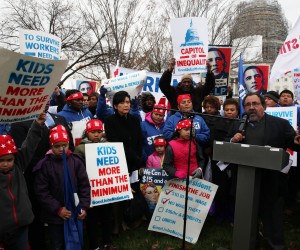
By Elena Schneidernov
The cafeteria lines in the Capitol Visitors Center and the National Zoo may have moved slower on Thursday after hundreds of federally contracted food service workers went on a one-day strike.
Organized labor groups want to try to pressure President Obama to pass executive orders to prioritize federal contracting to companies that pay workers $15 an hour, provide benefits — like health insurance and fair scheduling — and allow collective bargaining.
“It’s costing taxpayers twice: once for the contract and once for public services because workers are not earning enough on their own,” said Paco Fabian, spokesman for the Good Jobs Campaign, the labor advocacy group that organized the protest on Thursday.
Food service workers did not show up for their jobs at the visitors center, the zoo, the Pentagon, Union Station, the Smithsonian Air and Space Museum, and the Ronald Reagan Building and International Trade Center. Instead, hundreds gathered outside the Capitol, holding signs portraying the iconic 2008 campaign image of Mr. Obama with the word “help” below it instead of “change.”
President Obama has already signed executive orders that required federally contracted companies to pay their employees $10.10 an hour and tightened regulations on workplace safety violations. But the strikers said they wanted a living wage, not just a minimum wage.
“I don’t want to rely on food stamps or public assistance, but the minimum wage is not enough,” said Reginald Lewis Sr., a dishwasher in the Capitol Visitors Center. If he were to receive a raise, Mr. Lewis said he would like to send money to his daughter, a 20-year-old student at the Ohio State University. “I want to be there for her, but I can’t,” he said.
Dyann Jaggers, 66, is a food service worker at the National Zoo. Ms. Jaggers said she had a heart attack a month ago and was hospitalized for several days. But she was back at work the day after she was released because she could not afford to stay home. “We are at the bottom of the food chain,” she said.
Voters approved increasing the minimum wage in several midterm elections, even in some traditionally Republican-controlled states like Alaska, Arkansas, Nebraska and South Dakota.
Representative Keith Ellison, Democrat of Minnesota, sees the passage of ballot initiatives last week as a signal to the new Congress that Americans want more wage increases. He pointed to Senator Mark Pryor, Democrat of Arkansas, who lost his bid for the Senate seat, “but minimum wage did win,” he said. “There’s this irony where these guys who are conservatives and opposing the minimum wage are winning on the same ballot as the minimum wage, so I think there’s an opportunity here.”
Conservatives argue that increasing wages would force businesses to lay off workers. House Speaker John A. Boehner emphasized this point when Mr. Obama announced his executive order last winter, and he is unlikely to bring up the issue for congressional debate.
In general, federal contractors do not support the campaign either. Stan Soloway, president and chief executive of the Professional Services Council, a trade group that lobbies for hundreds of government contractors, said the strike’s demands oversimplify the discussion. “The living wage is very different than the minimum wage, and we need a policy discussion as to whether that should be the standard for everyone, not just government contractors,” he said.
Some workers at the protest said they were nervous about returning to their jobs. “I don’t know what’s going to happen when I go back,” said Robyn Law, 27, a cook at the Pentagon. Ms. Law said she was frustrated that in her eight years working at the Pentagon, she had received only one raise, to $8.50 an hour from $8. “But I’ll be back there at 5:30 tomorrow morning,” she added.
Original Article
